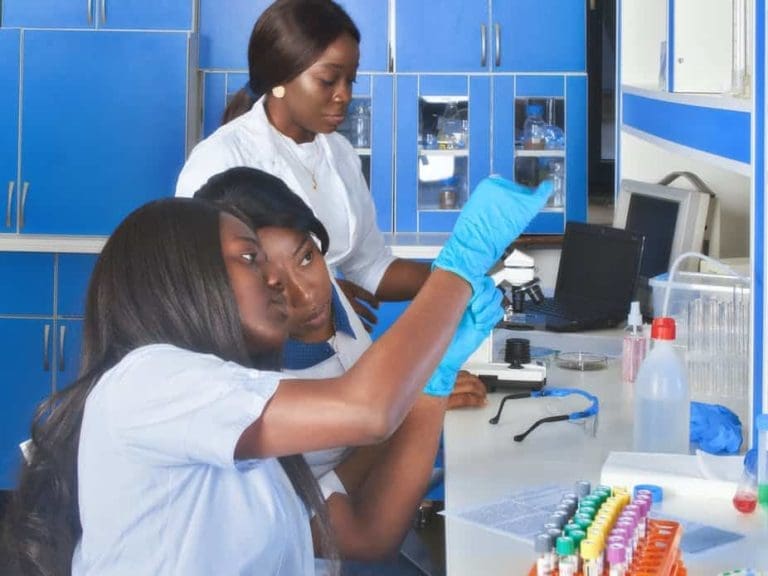In April 2020, about two months after the African continent recorded its first case of COVID-19, the African Academy of Sciences undertook an extensive survey of its members. This allowed hundreds of scientists in African countries to identify COVID-19 related research priorities across a range of disciplines. The Conversation Africa’s Natasha Joseph asked Dr Moses Alobo, who is heading the Academy’s COVID-19 response efforts, to explain the survey’s findings and how they can be applied.
What was the purpose of the survey, and who took part?
The COVID-19 crisis is global, and scientists are still trying to understand this SARS-CoV-2 virus. The African Academy of Sciences recognised there was an urgent need to help scientists, researchers and practitioners on the continent in pharmaceutical and non-pharmaceutical mitigation efforts. We need to provide guidance and resources that will help address COVID-19 by shifting the focus to specific needs that may be unique to the African continent. This is part of our work in providing advisory and think tank functions to, among other things, consolidate the continent’s scientific research efforts.
The survey helped to develop a prioritisation list for research and development for the COVID-19 pandemic in Africa. Most of those priorities were based on the World Health Organisation’s (WHO) Research Roadmap. We asked researchers to rank the priorities listed by the WHO to get an understanding of how Africa’s scientists are thinking about the pandemic. The Academy also hosted a webinar with nearly 300 participants before launching the survey, and some priorities not identified by the WHO were discussed there.
There have been several public health methods to combat COVID-19. Social distancing, movement restrictions and wearing protective clothing like masks are all important, practical steps.
This report focused on another element of the “what next” around the virus: quite simply, we’re going to need a lot of research. And that research will need to be multidisciplinary. That’s where the variety of our members’ research interests is so important: we had respondents from the biomedical sciences, clinical and epidemiological research, social sciences, policy making and management sciences, among others.
In total, 845 respondents from 56 countries globally took part – 39 of those were African countries. Seventy-nine percent of all respondents were based at an African institution and working in Africa; 12% reported being affiliated with an institution outside Africa but working in Africa at the time of the survey. The remaining respondents did not identify themselves geographically.
Which priorities topped the list for most respondents?
Most thought there should be a greater focus on clinical management. On this point, they particularly identified the need to develop protocols for managing severe disease in places that lack intensive care facilities. Another important point they made was the need to determine interventions that improve clinical outcomes for patients infected with COVID-19.
Read more:
Lockdowns and research: what we lost and what we stand to gain
Infection prevention and control emerged as another key area. Respondents wanted to understand how effective movement control strategies are in preventing secondary transmission in both health care settings and communities.
Most respondents also felt that understanding the virus’s natural history, transmission and diagnostics was important. This, they explained, could be used to support work to develop cheaper, faster and easier antigen tests for detecting the virus while out in the field. Essentially, they are calling for work towards cost-effective diagnostic tools that can accurately and efficiently pick out viral particles from infected people.
There was a call for epidemiological studies that help describe COVID-19’s transmission dynamics. These studies can be used to understand the spread of the virus nationally, regionally and globally.
So what happens next? How can these findings be applied?
The findings will be vital in streamlining research efforts. Some are based on the WHO Roadmap. Other priority areas – like waste management, mental health, food and nutritional security, and the indirect effects of the pandemic in areas like maternal and newborn health and management of other chronic conditions – were added by researchers in Africa. This is key: these new, emerging priorities may become more important with time, both on the continent and elsewhere.
Of course, the flip side is also true. As further work is undertaken and we start to understand some research areas better in various contexts, priorities may shift again. Those shifts will need to be based on various communities’ needs and on what interventions are available.
The report can also help to inform governments’ investments in research and development. Ministers of education, science and technology from several African countries have met to prepare a response to COVID-19 in terms of interventions in education, science and technology. After their deliberations, the ministers recommended that research and development funds should be set up specifically for fighting pandemics.
But there was no clarity as to what kind of research should be funded. Our priority-setting work represents a step towards addressing this issue and ensuring that governments know what scientists believe is important when it comes to funding research and development into COVID-19 and other pandemics.![]()
![]()
Moses Alobo, Programme Manager for Grand Challenges Africa, African Academy of Sciences
This article is republished from The Conversation under a Creative Commons license. Read the original article.

